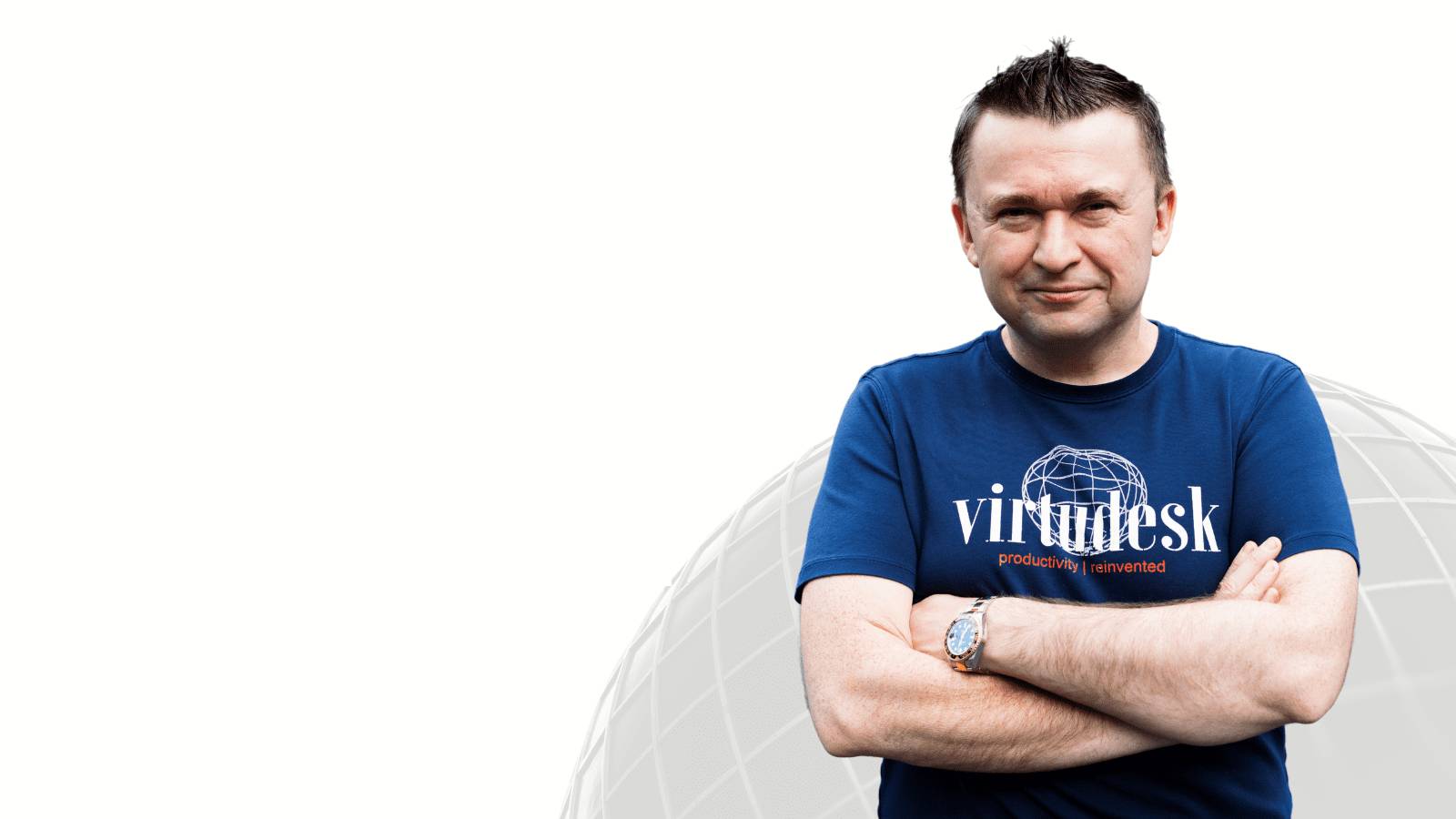Founder@ Interview
Interview with Pavel Stepanov

“Just do it. Don’t worry about perfection and don’t overanalyze your next move for the company. Execution trumps overthinking. I see many entrepreneurs get scared to act when it comes to making important decisions to move their business forward. ” – Pavel Stepanov
Today we feature Pavel Stepanov, the founder at Virtudesk. We hear their story in their own words, their successes, their challenges and their insights.
Let’s start by getting to know you. Can you please tell us a little bit about you and what you do?
I am Pavel Stepanov. I am a business owner and entrepreneur, the Founder and CEO of Virtudesk. We help real estate agents, entrepreneurs and other business owners scale their businesses by providing virtual assistant services.
A great introduction and start to this interview. Can you please tell us, how did you start, from what age, and what made you decide to change direction and start?
I was born in Siberia. I emigrated to the US in 1997 to look for better opportunities and pursue my dreams. After I came to America, I planned on getting into a University but, I wasn’t quite sure what to study. I first picked journalism, but I realized that journalism was not something I wanted to pursue.
Then, I took law as I always dreamed of becoming a lawyer. While in Law school, I also took some real estate classes and was fascinated with the concept of property ownership and the opportunities it could unlock. After graduating from law school and passing the bar exam, I discovered that real estate was more in tune with my entrepreneurial mode and DNA and I became a real estate broker.
For 3 years, I practiced real estate at a 100% commission brokerage. At the time, I was working 12-16 hour days with no real break. I was doing everything from Marketing, setting appointments, outbound calling, meeting with clients, going to showings, etc. I then decided to hire my first virtual assistant in order to help me set more appointments. The results were dramatic.
My virtual assistant was responsible for doing outbound calling and setting up appointments. I could barely keep up, and after hiring her, I spent a lot of my time going to appointments.
My sales that year tripled! No joke. I started to realize the value of virtual assistants and the power of delegating. After those 3 years, I started my own brokerage, Nexus Realty in 2015. As I brought on more brokers, I realized they had the same problem – time. Just like I did. I discovered they needed virtual assistants as much as I did, and they started asking me about it. That’s when the idea of Virtudesk came on.
I realized most of the agents around me desperately needed help, so I started Virtudesk to assist Nexus, and saw how I could expand past my brokerage due to this common pain point that all agents and entrepreneurs face.
A couple of years after starting Virtudesk, I started building a new product, called Tymbl. This autodialer was designed to automate outbound calling for real estate agents and sales agents.
I designed this platform so I could help agents keep track of all of their leads, create campaigns around their lead status, and bulk analyze the calling metrics. It is still in its start-up phase, but it has helped Virtudesk and other agents so much already!
Thank you for that insight. So can you tell us…What does your business do and where is your company based?
Virtudesk is a virtual assistant company and we help entrepreneurs scale and automate their businesses through virtual assistants and technology. We offer highly-trained virtual assistants based in the Philippines, specializing in services such as real estate prospecting, marketing, administrative work, customer service, and transaction coordination.
We help real estate agents, entrepreneurs, and small-to-medium-sized business owners scale their businesses by teaching them how to delegate certain parts of their business to virtual assistants so they can focus on the 20% of their business that produces 80% of the results.
We primarily serve the real estate industry in the United States and Canada right now, but are currently expanding into other industries such as Finance, Retail, Healthcare, Insurance, and others.
What’s the story behind your success? What led to your aha moment? how did you get to where you are now?
I noticed the uniqueness of virtual assistance and its benefits the first year I hired one. The results are amazing as my revenue tripled in just a year, so I decided to take advantage of it by founding Virtudesk. I believe that mindset is everything in life.
No matter what kind of hardship you are going through, if you have the right attitude, it will help you stay focused, problem-solve, and get through painful situations. Plus, thinking long-term about what I wanted and making a plan to achieve it really helped me. When you think long-term and you identify what you want out of a situation, the steps to get there become more clear, and it stops being a quick fix solution or endeavor. Then, after years of working hard, I can now say that I have amazing people, friends and family, in my life that make it all worth it.
Unfortunately, I didn’t have anyone in particular who I could look to for guidance, or who made the move more manageable. Of course, there were people who helped me by giving me advice on how to find a job and get scholarships. However, I didn’t come to the United States already knowing someone, nor did I bring anyone with me. It was a difficult transition where I had to figure a lot of things out.
However, having a positive mindset, networking with others, asking questions wherever I could, and working really hard helped me to make the transition more manageable.
Thank you for sharing that. What’s been your life’s biggest lesson so far?
One of the biggest challenges I struggled with was establishing and building the systems needed for operational effectiveness. The most challenging part of starting Virtudesk was that I had to assign roles to every person in the organization and have a detailed job description of what they would be doing in that role.
I had to tell people in detail what their defined role was before I even knew what the role entailed myself. It required me to sit down and really think and write out what I wanted each person to do, and how I wanted to create my systems. I learned that I needed to first create the role (and a detailed version of it), and then hire.
Then create systems. I had to do this in no other order. At the beginning of starting your own business, and especially as you continue to grow, knowledge is the hardest to come by, from yourself and others. You have to learn and make mistakes as you go. You also have to hire people who are extremely knowledgeable and talented at what they do, so they can provide your company continual value as well.
Part of this struggle of building out systems includes creating several layers of management and a hierarchy of who would go to who. I also had to address who would cover what if a manager went out sick or on vacation. Could I ensure the job would still get done well with this person absent?
This was different from when I started my brokerage, Nexus Realty, as Virtudesk required multiple layers of people to run different functions. Now, I’m doing this again with my Tymbl, as it’s still in the start-up phase.
I wish I knew how to hire slow and fire fast. Especially in the beginning of Virtudesk, I was too fast to hire and slow to fire. I onboarded people quickly, because I needed help, but didn’t take the proper time to truly evaluate their skills, their intentions for the company, and their background. More importantly, I didn’t take the time on whether or not they would be a good fit for the job or with the company. I believe this is paramount to a successful working relationship and the employee’s success as well.
You can hire 100 qualified people, but if they don’t think similarly to you on where to take the business or they don’t get along with the teams already on staff, then progress can be slowed, and less will get done to benefit the company overall and in the long-term.
Even firing slow was a problem I had to overcome. Hiring someone can be scary, as you are taking the leap to trust them with part of your company. That’s why in the beginning it was hard for me to fire, as you do invest in them and put faith in them that they will do well. When you let someone go, you’re letting them and yourself down, at least that’s how it felt in the beginning.
If you were to go back in time, what piece of advice would you give to your younger self?
I would tell my younger self to always stay strong. Life was difficult during our time growing up to the point where our childhood friends did not even survive because of poverty. You made the right decision to migrate to the US for better opportunities. Learn as much as you can to help yourself and understand what you don’t know. Continue to move forward despite the difficulties and mistakes you make. Don’t think about what lies ahead. What matters most are your steps, determination, and your passion to pursue what you wanted.
I want to say thank you to those people who doubted me because they lit my fire to keep moving forward and prove to myself that I can. I can proudly say they are all part of my success. I never doubted myself becoming an entrepreneur. As I said, it’s all about mindset. Having the right attitude keeps you going, and when your goals are clear, you know what steps to take to get you there. This is what I wanted and this is what I become.
We’re nearly halfway through our interview so it’s a great time to ask how does your business run. What three tools make your business run better?
My business is run by virtual assistants. Putting the right people on your team is one of your greatest edges. Besides hiring amazing people to your team, getting a robust CRM is essential to grow.
I remembered not having one before is total chaos. Our database is a mess due to duplicated contacts and we are losing a lot of great deals. A good CRM will help you keep track of leads, organize them efficiently, automate many processes to maximize efficiency, and allow you to deliver a much better customer journey. It will give your team all of the information they need to properly nurture leads and push them through the sales funnel.
The next is going to be a project management tool. We currently use ClickUp. This particular tool I often find is underestimated. When you are growing your team, and you want to maximize efficiency and productivity, a project management tool is vital. This will allow all of your teams to better track deadlines, complete deliverables, and collaborate more effectively. Plus, it can be good for cross-department collaboration. When you are consistently adding new team members, it can help them keep track of what they are responsible for, and it can act as a resource hub.
Another tool that I would recommend is a good email marketing service. This will help you send mass emails to all of the contacts in your CRM. We currently use MailChimp as its features fit our current email strategy. Email has proven to be one of the best ways to nurture leads. We have gotten many sign-ups from emails. Although the amount of promotional emails have gone up, when you create value-driven emails, you will get a high engagement rate.
What do you know now that you wished you had known before?
I wish I knew how to hire slow and fire fast. Especially in the beginning of Virtudesk, I was too fast to hire and slow to fire. I onboarded people quickly, because I needed help, but didn’t take the proper time to truly evaluate their skills, their intentions for the company, and their background. More importantly, I didn’t take the time on whether or not they would be a good fit for the job or with the company.
I believe this is paramount to a successful working relationship and the employee’s success as well. You can hire 100 qualified people, but if they don’t think similarly to you on where to take the business or they don’t get along with the teams already on staff, then progress can be slowed, and less will get done to benefit the company overall and in the long-term.
Even firing slow was a problem I had to overcome. Hiring someone can be scary, as you are taking the leap to trust them with part of your company. That’s why in the beginning it was hard for me to fire, as you do invest in them and put faith in them that they will do well. When you let someone go, you’re letting them and yourself down, at least that’s how it felt in the beginning.

What has been your greatest or proudest achievement or moment?
Virtudesk being included in this year’s Inc. 5000’s list of fastest-growing companies in the US, ranking #1068.
What future life goals do you want to achieve and why?
My future life goals are watching my kids grow, devoting enough time for them, and seeing Virtudesk grow into a large-cap company.
To finish our inspire questions…”We believe that sharing inspiring words can inspire others.” If there was one positive thing you would say to someone to inspire and empower them what would it be and why?
Just do it. Don’t worry about perfection and don’t overanalyze your next move for the company. Execution trumps overthinking. I see many entrepreneurs get scared to act when it comes to making important decisions to move their business forward.
They are afraid of making mistakes. However, they have to understand that making mistakes is not only inevitable, but essential to learn and grow, and advance the business. It will never be the right time, you will never be ready or prepared to start your business or take on a new project or initiative. So, just do it.
“Thank you it has been great learning more about your founder story and Virtudesk”
To learn more about Virtudesk Visit https://myvirtudesk.com
Inspired by this story? Please share this story and other founder stories.
For more inspiring founders stories check out Founder Stories.
Have an inspiring founder story?
Every entrepreneur’s journey is unique and powerful.
Your story of perseverance and success could be the spark that ignites the next generation of world-changing ideas. By sharing your experiences, you’re not just telling a story – you’re lighting a path for others to follow, dream, and achieve.
Disclaimer:
The views, thoughts, information, and opinions expressed in the text, videos, images belong solely to those of the individuals involved, and do not necessarily represent those of Founderat.com and its corporate owners, employees, organization, committee, or other group or individuals.





![[Company Name]'s Founder Stories](/wp-content/uploads/2024/10/Fonuder@-Partners-01a-150x150.png)
















